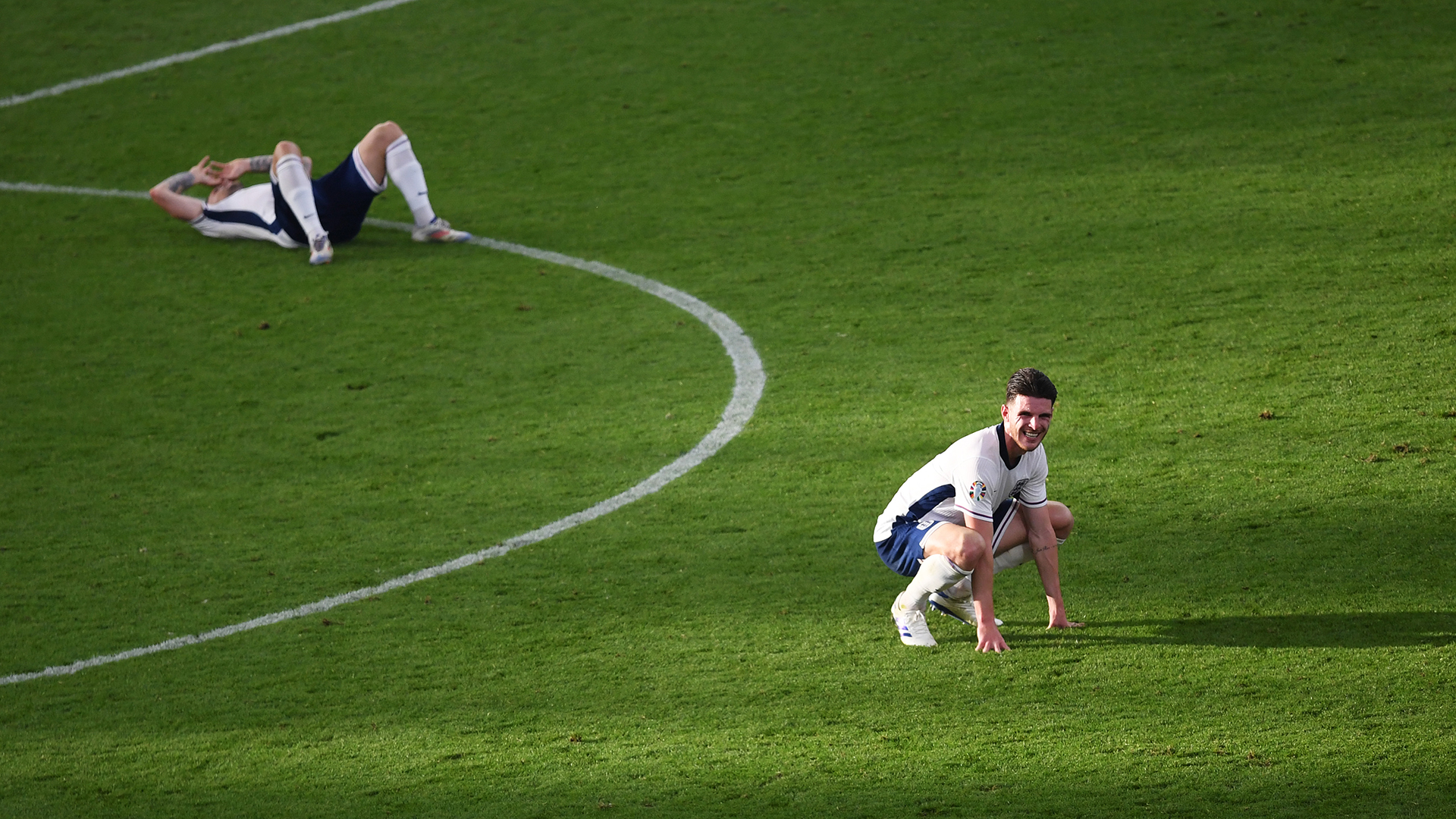Through two matches at Euro 2024, England sits atop Group C, with a relatively comfortable path into the knockout round. A win against Slovenia in the group finale on Tuesday would seal the Three Lions' top spot, as everyone expected heading into the tournament. Why, then, does England feel so fraudulent? After its dull 1-0 win over Serbia on Sunday, and its nearly catastrophic 1-1 draw against Denmark on Thursday, this team has not looked at all like one that should be counted among the elites.
While the Serbia match was perhaps much ado about nothing, given that England scored early then saw out the match successfully if distressingly, the Denmark game was more ominous. Part of it is that Denmark is better than Serbia, and the Danes surely played well, even after going down 1-0 via an 18th-minute Harry Kane goal off a cutback and ensuing scramble in the box.
¡Harry Kaneeeeeeeeeeee! 🌀 ¡Gooool de Inglaterra!
— TUDN USA (@TUDNUSA) June 20, 2024
🇩🇰 Dinamarca 0-1 Inglaterra 🏴
🔴 EN VIVO: @VIX
📲🇺🇸 https://t.co/s7RHsxvMe2#EuroEnViX pic.twitter.com/WPTYo8zvhF
The other part, though, is that England did what England does under manager Gareth Southgate after taking a lead: It turtled up and sat back, inviting Denmark to attack for more than an hour, in hopes of seeing out yet another 1-0 win. While that approach worked insofar as it limited chances inside the box for the Danes, England ran into what is becoming the way to score at this tournament: an outside-the-box screamer.
🇩🇰¡Golazoooooo! ¡Golazoooo de Dinamarcaaaa! 🔥😍
— TUDN USA (@TUDNUSA) June 20, 2024
🇩🇰 Dinamarca 1-1 Inglaterra 🏴
🔴 EN VIVO: @VIX
📲🇺🇸 https://t.co/s7RHsxvMe2#EuroEnViX pic.twitter.com/FAUMiZ6CgI
This one came 16 minutes after Kane's goal, courtesy of the right foot of Morten Hjulmand, Denmark's 24-year-old defensive midfielder who had scored exactly zero international goals prior to Thursday. Aside from Jordan Pickford, who is both a pretty good goalie and not exactly great compared to some other keepers in this tournament, no one really could have done better on the England side to keep this one out, so while the result was a goal, that particular play says less about England's futility than the game as a whole did.
England has two tightly connected problems, and both were on display on Thursday. The first has to do with the player pool. While England has as much talent as anyone in the world, there is quite a bit of positional and skillset overlap in its best players. This exacerbates the second problem: Southgate is a stubborn pragmatist with little tactical creativity. This leads to multiple issues up and down the field, both in terms of congestion and players out of position.
Take the starting lineup against Denmark, which featured three right backs by trade, and three players who are best deployed centrally in attack. To solve the former problem, Southgate started Kyle Walker at right back, Kieran Trippier at left back, and Trent Alexander-Arnold in a midfield double pivot with Declan Rice. Walker was passable in his natural position, even though he spends as much time at center back in a back three with his club, Manchester City, as he does at right back these days. Trippier put in a decent enough defensive shift, but playing on the wrong side dulled his attacking and, especially, his crossing, which is the only reason to start Trippier anyway. Alexander-Arnold did about as well as he could playing in midfield, something people have clamored for but for which he doesn't look ready; he was subbed off in the 54th minute, rightfully, but I'm not sure what Southgate could have expected from him other than an average performance.
Frankly, the attacking problems, combined with Southgate's insistence that his team sit deep after Kane's goal, are in more dire need of a solution. On paper, the attacking quartet of Kane, Jude Bellingham, Phil Foden, and Bukayo Saka should be the best in the Euros. In practice, however, it fails because Saka is the only player who seems to actually fit out wide. Bellingham and Kane both play centrally for club and country, and with Kane more of a complete striker who drops back to create, that duo might already be incompatible. Add in Foden, who was a left winger on the team sheet but another central attacker in action, and the middle of the pitch simply had too many English bodies with no real way of connecting them into a cohesive attack.
At times, Kane, who can be unselfish to a flaw, would drift out wide to clear space for Foden and Bellingham, which is not where England should want its all-time leading scorer to be. It didn't help that Foden was barely involved, just as he was similarly passive against Serbia, while Bellingham was atrocious against Denmark. (Saka was good, as Saka usually is, but was generally isolated out wide, so he didn't have much influence on the game.) For this quartet to work, it would take a more inventive manager who can help them share the space they all want to play in, and Southgate has not shown that he can be that type of manager.
Even Southgate realized things weren't working, and he took the dramatic move of subbing out all three of Foden, Kane, and Saka at once in order to bring on a more traditionally balanced front line. Eberechi Eze, Ollie Watkins, and Jarrod Bowen may not be as good or as heralded as the players they replaced, but with that trio, England had more traditional width and runs behind the backline for the final 20 minutes. It's not a coincidence that England looked more like a coherent team after those changes, and while I don't think the entire starting quartet should be split up, at least one of Foden and Bellingham should come off the bench going forward. For my money, Eze-Kane-Saka is the best-fitting trio Southgate could start, and if he can get Bellingham to play a bit further back, closer to the No. 8 position he played for Dortmund, rather than the striker-in-all-but-name he adopted at Real Madrid, then that's for the best.
That type of move goes against what Southgate has shown since he took over the side months after Euro 2016, and while it's hard to argue with his results—England made the semifinals of the 2018 World Cup, the final of the 2021 Euro, and only went out in the quarterfinals of the 2022 World Cup after running into France—it's also becoming more evident that Southgate has no new ideas. This is what his England will be, something that is never going to reach the heights promised by all of its elite attackers. The worst thing that can happen in an England match is an early English goal, because Southgate will ignore both analytics and conventional wisdom—both of which state that teams who go up early should just continue to play their game as normal, since they already set up to not concede; that is one of the main goals of soccer, after all—in order to try to squeak by.
If it's not his actual preference to win every match 1-0, it's at least his gameplan. England is too good for that kind of conservatism, and while Denmark couldn't quite punish them in full by picking up a shock win—not for lack of trying, though; the Danes were the better team and had better chances—someone in the latter stages of this tournament probably will. For "it" to "come home," Southgate will have to change his ways, or England will have to change its manager. Otherwise, performances will continue to feel so terrible as to dull the excitement from what should, in theory, be England's best chance an international trophy in decades.






